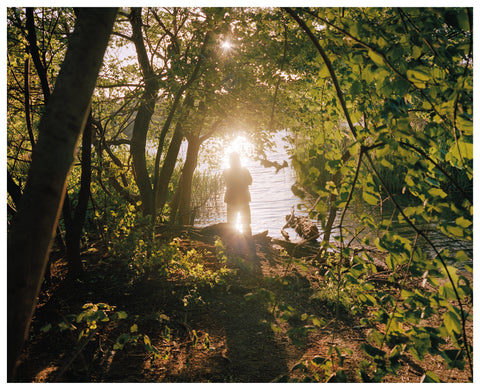
We were southerners. People accustomed to the south’s smallness, its lack of majesty and moment – not at all people who “traveled,” but who only took “trips” to single destinations for single reasons, after which we came home where we belonged. Still. Easy to imagine how the great national cataract could appeal to us – we, who had to be up north, anyway, this one time – even if the appeal didn’t feel instinctual, seemed a bit wrong, even if we’d never known we wanted to go or could go, only knew about the falls off the cereal box, and then only that it was there. People had gone over in barrels (and perished?). Men walked across it on tight ropes. Marilyn Monroe had gone there. The Palace of Lights was there. It was an inspiration for things. Yet it had a carnival feel and surely didn’t represent America. It was simply a great thing in America, a marvel that drew others to itself. Like the (unvisited) Grand Canyon. Or the (unvisited) Redwoods. Or the Mammoth Cave, which we had experienced. Newly-weds went there. Why, precisely, we weren’t sure, since we weren’t lovers – a boy with his grandparents. We merely loved each other. Maybe, though, to stand close to falling water of such magnitude brought good luck, which we all three believed in. Like touching an elephant. Or kissing the Blarney Stone.
In any case, we officially enjoyed the great swirling, rushing downward-ness against whose force we assumed we’d be powerless. We liked the feel of temptation, of mingling our lesser individualities with the massive, the ineluctable and the irresistible, adjectives that didn’t modify us or where we hailed from, or how we lived, or what he (my grandfather) did for a living – hotel man - or our car, a red Buick four-holer. Transformative was not an adjective we knew. I personally liked standing close to the roar, but from the safe, dry places provided, and calculating: where in the river’s great green translucence, as smooth as longing, where in its locomotive transition – horizontal to vertical – where out there, were I there, could I still have a chance, still clamber out, emerge cold and laughing? Where was the fatal point, when you knew it was all up? There would definitely be time to realize that as you carried along. I am gone too far now. The Christian-fear paradigm did not come directly to mind (though to others it must’ve). Still, to detect the point out in the rush toward misty disappearance must’ve felt cleansing - though I don’t remember. I only felt the tingling down through my belly to my thighs, felt my heart go and go, as if I stood beside an accident not quite happening. Being from Little Rock became less important, less necessary to tell to strangers. Little Rock itself seemed exotic when considered beside Niagara Falls (though of course it wasn’t). That was a benefit of travel: home became mysterious. Canada, its presence, was a surprise and a confusion to us: that we could so easily go there. When we had thought about Niagara Falls - about going - we hadn’t thought about what else might be there. A town with people, cars, lives. (Is there a town beside the Blarney Stone?) That another country was near was an afterthought.
Canada, its presence, was a surprise and a confusion to us: that we could so easily go there. When we had thought about Niagara Falls - about going - we hadn’t thought about what else might be there. A town with people, cars, lives. (Is there a town beside the Blarney Stone?) That another country was near was an afterthought.
But when we’d seen the Falls – two of them, it turned out – ridden the boat, taken our pictures of each other, crossed a national border we hadn’t known we’d cross, we walked along the two little Canadian Streets where tourists went. And it seemed better than on our side. Cleaner. Crisp in some way. A feeling of things done correctly. We bought trinkets with our American money (the American Falls within a heavy-smooth glass paper weight; a Statue of Liberty made of polished lead; a little Canada flag with the leaf; a tiny Eiffel Tower). We looked into a store that featured colorful apparel from Scotland – too heavy for back home, of course, where it wasn’t cold, but still nice. We ate our lunch (wurst) in a place below floors with a rathskeller theme, bleary leaded-green windows, heavy doors and yellow lamps that hung down from the smoky ceiling. It was noisy and tuba music played. I was eighteen, yes, and had my first legal beer there, in Canada, from a bottle with a blue label and blue in its name. And then we simply walked outside into the clean, humid, northern air and looked around. You could be there and not know there was a falls close by. “What do you think?” my grandfather (the man in the picture) said to my grandmother and me. “Are we ready to go? Have we seen enough? We saw the Falls. We went to Canada (we had Yankee tickets for the next day). I’d say that’s all there is, wouldn’t you?” And I remember thinking, or possibly I only felt something and give that feeling these words years on: there was something wrong about it all, the garish public-ness, the too great dimension, the unsuppressable in it. But it was also wrong to come so far to view such a thing and leave in an hour or two. A snapshot’s worth. You would need to stay, find your private use of such a grand thing - grand event, spectacle, calamity. To make more of it. To find an answering gesture that was commensurate, and that could change wrong to right. But I couldn’t imagine how I would. And so I said “Yes. This much of it is enough.” After which we left. I have never seen it again. Never wanted to.
And I remember thinking, or possibly I only felt something and give that feeling these words years on: there was something wrong about it all, the garish public-ness, the too great dimension, the unsuppressable in it. But it was also wrong to come so far to view such a thing and leave in an hour or two. A snapshot’s worth. You would need to stay, find your private use of such a grand thing - grand event, spectacle, calamity. To make more of it. To find an answering gesture that was commensurate, and that could change wrong to right. But I couldn’t imagine how I would. And so I said “Yes. This much of it is enough.” After which we left. I have never seen it again. Never wanted to.

Excerpt from '1962' by Richard Ford, from Niagara by Alec Soth, first published in September 2018.
Faux leather bound hardback with tipped in image
28 x 32 cm, 104 pages
€55 £50 $65
Add to cart






